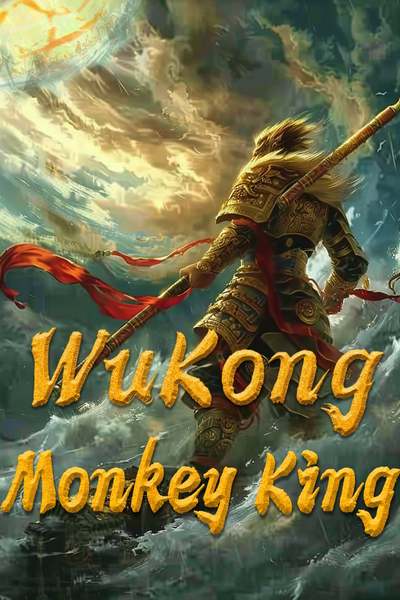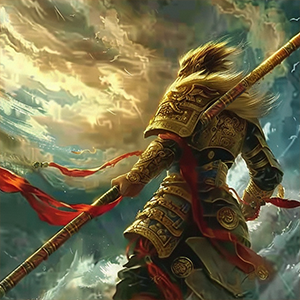Folk Deities (The following deities are not frequently mentioned in "Journey to the West"):
God of Wealth: Led by Zhao Gongming, with subordinates including the Five Major Gods of Wealth, the Five Directional Gods of Wealth, Wealth-Bringing Boys and Girls, and the Four Great Wealth-Attracting Divine Beasts (Pixiu, Jin Chan, Qilin, Dragon Turtle).
Heavenly Empress (Mazu, originally named Lin Mo, commonly known as the "Goddess of the Sea". She is the legendary goddess in charge of maritime voyages.)
City God (In Daoism, the guardian deity of a city, responsible for the yin realm affairs of the area. The position is typically held by loyal and virtuous historical figures.)
Earth God (A grassroots deity managing the community's tutelary god, acting as the local administrative deity to protect the peace and tranquility of the community. Ancient Chinese burials were mostly "earth burials", so the Earth God also manages the registry of the deceased in the community.)
God of Happiness (Also known as the God of Auspiciousness, traditionally believed to be the deity of joy and happiness, who oversees celebrations without manifesting a physical form.)
Toilet Goddess Zigu (The goddess of the toilet. However, Zigu is not primarily concerned with toilets but is known for her prophetic abilities, often worshiped at home for divination purposes.)
Shi Gandang (Tai Shan Stone, Shi Gandang varies in style, some with bas-relief carvings of lion or tiger heads on the stele, others with no decoration, merely inscribed with "Shi Gandang" or "Tai Shan Shi Gandang", and painted in vermilion. Its function evolved from suppressing misfortune and warding off evil to dispelling wind, preventing water damage, and eliminating disasters. Thus, people began to carve "Tai Shan Shi Gandang" on rocks from Mount Tai and place them at wall bases, alleys, etc.)
Door Gods (Deities guarding the doors. As guardian deities in folk belief, their images are posted on doors to drive away evil spirits, protect the household, ensure safety, aid in success, and bring auspiciousness. They are popular protective deities in Han Chinese folk culture.)
Qin Shubao (Qin Qiong, placed on the left door)
Yuchi Jingde (Yuchi Gong, placed on the right door).
Bed God (Worshiped during wedding ceremonies, wishing for the newlyweds to be deeply in love and live a happy and fulfilled life.)
Bed God: Nine Heavens, Monitoring Birth, Lord Ming Su
Bed Goddess: Nine Heavens, Guarding the Bedroom, Holy Mother Tianjun
Child God (Prayed to for children's intelligence and wit.)
Child God Xiang Tuo (Enlightened at a young age, known as a prodigy. Allegedly, he conversed fluidly with Confucius, surpassing him and becoming his teacher.)
Emperor Zhu Tian Chongzhen (Prayed to for blessings and disaster relief.)
Tea God Lu Yu (Lu Yu was devoted to tea throughout his life, proficient in tea culture, and famous for writing "The Classic of Tea", making significant contributions to the development of the global tea industry, revered as the "Immortal of Tea" and "Saint of Tea".)
Flower God (Oversees all flowers, managing the harmony of nature and the flourishing of plants.)
Wine God Du Kang (Discovered fermentation, inventing a complete set of winemaking techniques.)
Carpentry Master God Lu Ban (Many carpentry tools were invented by him, hailed as the Saint of Craftsmanship, Saint of Carpentry, and "Ancestor of All Workers".)
Textile Goddess Huang Daopo (Taught textile skills, innovated cotton textile tools, promoted cotton cultivation, honored as the "Goddess of Clothing and Bedding".)
Silkworm Goddess Ma Tou Niang (Worshipped as the deity overseeing sericulture. Sacrifices are made before silk farming as a sign of devotion and in hope of smooth operations.)
Prison God Gao Tao (Legend has it that China's first "Prison Code" was established by Gao Tao, advocating "clear understanding of the five punishments to assist the five teachings", revered as the "Ancestor of Chinese Justice".)
Theater God Tang Ming Huang (The deity worshipped in the opera circle is called the Theater God, with Tang Ming Huang regarded as the "Elderly Scholar God".)
Horse God Ma Wang Ye (Originally the Room Star in heaven, also known as "Tianji". Originally serving the Queen Mother's chariot, he was relegated to the human realm for grumbling while left outside the Heavenly Gate during the Peach Banquet. Folklore considers this deity to oversee the surveillance of horses and also possesses the divine attribute of punishing evildoers. He is seen as a deity that can guide people onto the right path, drive away evil, protect oneself, and is revered as the "Wonderful True Monarch of the Taoist Way".)
Frog God Bai Yu Chan (A deity revered in folk belief, associated with recent venerations of frog deities, and speculated to be the same as the immortal Bai Yu Chan in Daoist beliefs.)
Locust-Driving God Liu Meng (A legendary protective deity governing agricultural pest control.)
Snake King Shi Xiang Gong (Shi Quan, in modern legends, he transformed from a human into the Snake King, known as the deity of snake repelling.)
Plague God (In Chinese folklore, the deity overseeing plagues and diseases, temples annually worship the Five Gods to pray for the safety of livestock, referring to these five deities.)
Spring Plague: Zhang Yuanbo
Summer Plague: Liu Yuanda
Autumn Plague: Zhao Gongming
Winter Plague: Zhong Shigui
General Manager of Plagues: Shi Wenyi
Kiln God Taishang Laojun (In the coal industry, Taishang Laojun is revered as the god of coal kilns, prayed to for safety during coal mining operations.)
Thief God (In ancient times, thieves worshiped deities for divine protection, offering sacrifices to skilled individuals like Si Qian.)
God of Poverty ("Wisdom Poverty, Learning Poverty, Literature Poverty, Fate Poverty, Social Poverty", symbolizing deities that bring poverty, with a custom of sending away the Five Poverties on the fifth day of the Lunar New Year.)
The Eight Immortals (In Daoism, examples of ordinary people who attained immortality)
Li Tieguai, Lan Caihe, Han Xiangzi, Lv Dongbin, Zhang Guolao, He Xiangu, Han Zhongli, Cao Guojiu
The Quartet of Transcendent Sages (enlightened beings who have achieved a profound understanding of the cosmos and the primal truth of existence, genuinely awakening to the highest truths, known as "Transcendent Sages")
Sage NanHua (Zhuang Zhou, a venerated figure in Daoist philosophy prior to the Qin era)
Sage ChongXu (Lie Yukou, a philosopher of the pre-Qin Daoism, known for his deep explorations into the mysteries of the universe)
Sage TongXuan (allegedly Wenzi, with the given name Xin Shen, also known as Ji Ran, a philosopher of great depth)
Sage DongLing (Kang Cangzi, also referred to as Kang Sangzi or Geng Sangzi, a mystic with profound spiritual insights)
Immortals (Legendary sages and extraordinary individuals)
Chi Songzi (Rainmaster during the time of Shen Nong), Ning Fengzi (A sage from the era of Huang Di), Chi Jingzi (A sage from the era of Zhuanxu), Peng Zu (A great-grandson of Emperor Zhuanxu), Rong Cheng Gong (Teacher of Huang Di), An Qi Sheng (An immortal from the sea), Three Mao True Lords (Great Mao Lord Mao Ying, Middle Mao Lord Mao Gu, Lesser Mao Lord Mao Zhong), Xu Zhenjun (Daoist Xu Xun of the Jin dynasty)
Northern Five Ancestors (An important sect in Chinese Daoism - Quanzhen Sect, also known as Quanzhen Dao, revered the Five Ancestors of the Northern Tradition)
Donghua, Zifu, Fuyuan, Liji Daodun (Wang Xuanfu), Zhengyang, Kaiwu, Chuandao, Chuijiao Di Jun (Zhongli Quan), Chunyang, Yanzheng, Jinghua, Caiyou Di Jun (Lv Dongbin), Haichan, Mingwu, Hongdao, Chunyou Di Jun (Liu Haichan), Chongyang, Quanzhen, Kaihua, Fujie Di Jun (Wang Chongyang)
Sixty Jiazi Gods (Also known as Year Gods, or Tai Sui, responsible for the fortunes and misfortunes of people during their governing year, "leading various deities, regulating directions, managing seasonal changes, Overseeing the changes in the Heavenly Dao throughout the year".)
Jiazi Tai Sui — General Jin Bian、Yi Chou Tai Sui — General Chen Cai
Bing Yin Tai Sui — General Geng Zhang、Ding Mao Tai Sui — General Shen Xing
Wu Chen Tai Sui — General Zhao Da、Ji Si Tai Sui — General Guo Can
Geng Wu Tai Sui — General Wang Ji、Xin Wei Tai Sui — General Li Su
Ren Shen Tai Sui — General Liu Wang、Gui You Tai Sui — General Kang Zhi
Jia Xu Tai Sui — General Shi Guang、Yi Hai Tai Sui — General Ren Bao
Bing Zi Tai Sui — General Guo Jia、Ding Chou Tai Sui — General Wang Wen
Wu Yin Tai Sui — General Lu Xian、Ji Mao Tai Sui — General Long Zhong
Geng Chen Tai Sui — General Dong De、Xin Si Tai Sui — General Zheng Dan
Ren Wu Tai Sui — General Lu Ming、Gui Wei Tai Sui — General Wei Ren
Jia Shen Tai Sui — General Fang Jie、Yi You Tai Sui — General Jiang Chong
Bing Xu Tai Sui — General Bai Min、Ding Hai Tai Sui — General Feng Ji
Wu Zi Tai Sui — General Zou Dang、Ji Chou Tai Sui — General Fu You
Geng Yin Tai Sui — General Wu Huan、Xin Mao Tai Sui — General Fan Ning
Ren Chen Tai Sui — General Peng Tai、Gui Si Tai Sui — General Xu Dan
Jia Wu Tai Sui — General Zhang Ci、Yi Wei Tai Sui — General Yang Xian
Bing Shen Tai Sui — General Guan Zhong、Ding You Tai Sui — General Tang Jie
Wu Xu Tai Sui — General Jiang Wu、Ji Hai Tai Sui — General Xie Tai
Geng Zi Tai Sui — General Lu Mi、Xin Chou Tai Sui — General Yang Xin
Ren Yin Tai Sui — General He Ye、Gui Mao Tai Sui — General Pi Shi
Jia Chen Tai Sui — General Li Cheng、Yi Si Tai Sui — General Wu Sui
Bing Wu Tai Sui — General Wen Zhe、Ding Wei Tai Sui — General Miao Bing
Wu Shen Tai Sui — General Xu Hao、Ji You Tai Sui — General Cheng Bao
Geng Xu Tai Sui — General Ni Mi、Xin Hai Tai Sui — General Ye Jian
Ren Zi Tai Sui — General Qiu De、Gui Chou Tai Sui — General Zhu De
Jia Yin Tai Sui — General Zhang Chao、Yi Mao Tai Sui — General Wan Qing
Bing Chen Tai Sui — General Xin Ya、Ding Si Tai Sui — General Yang Yan
Wu Wu Tai Sui — General Li Qing、Ji Wei Tai Sui — General Fu Dang
Geng Shen Tai Sui — General Mao Zi、Xin You Tai Sui — General Shi Zheng
Ren Xu Tai Sui — General Hong Chong、Gui Hai Tai Sui — General Yu Cheng
The Four Great Heavenly Masters:
Zhang Daoling, Ge Xuan, Xu Xun, Sa Shoujian
Exorcising and Protecting the Dao Heavenly Venerable: Also known as the Emperor Gaoming. Ancestor Heavenly Master, namely the founder of Daoism, Zhang Daoling.
The Four Great Marshals:
Marshal Ma: Also known as Ma Tiangong, also called Huaguang Tianwang, Huaguang Dadi
Marshal Zhao: That is, the God of Wealth Zhao Gongming, also named Zhao Xuantan, the chief among the gods of wealth;
Marshal Wen: Wen Qiong, a general under the Emperor of the Eastern Mountain
Marshal Guan: Guan Yu.
The Twelve Elder Mothers (Mainly responsible for nurturing and managing human affairs in the world.)
Receiving Mother (also known as Grasping Mother): She oversees childbirth, pregnancy, and the safe growth of infants, regarded as the guardian deity of infants:
Life-Giving Mother: Presides over safe childbirth, protecting women's health during delivery, seen as the protective deity of midwifery.
Wealth-Bestowing Mother (also known as Blessing Mother): Possesses wealth and blessings, oversees granting people wealth and blessings.
Official Wealth Mother (also known as Official Granting Mother): Governs the awarding of official positions and fortunes, regarded as the guardian deity of officials.
Welcoming Mother: Oversees welcoming and entertaining guests, responsible for interpersonal relationships and popularity.
Community Guarding Mother: Protects the safety and welfare of villages, temples, communities, and residents.
Temple Guarding Mother: Protects Taoist temples, temples, and the activities of the faithful, regarded as the guardian deity of Taoist beliefs.
Longevity Mother: Governs people's longevity and health, seen as the protector of the elderly.
Harmony Mother: Manages farmland and crops, helping farmers achieve good harvests.
Nature Preserving Mother: Responsible for protecting the natural world and ecological environment, advocating for the care and cherish of natural resources.
Chastity Mother: Governs women's chastity and marital fidelity, seen as the protective deity of spouses and lovers.
Record Keeping Mother: Oversees the smooth conduct of exams and academic endeavors, helping students achieve good grades.











Comments (0)
See all